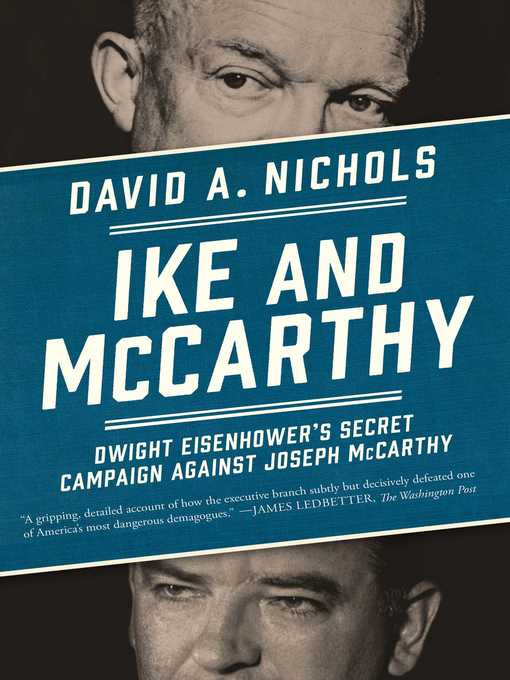
Ike and McCarthy
Dwight Eisenhower's Secret Campaign Against Joseph McCarthy
کتاب های مرتبط
- اطلاعات
- نقد و بررسی
- دیدگاه کاربران
نقد و بررسی

February 13, 2017
Joseph McCarthy (1908–1957) was an undistinguished Wisconsin senator who rocketed to fame in 1950 with spectacular claims of government infiltration by communists. When Eisenhower entered office in 1953, many observers criticized the new president for failing to “get down in the gutter” and publicly repudiate McCarthy. But Nichols (Eisenhower 1956), an Eisenhower specialist and former academic dean at Southwestern College, makes a reasonable case that Eisenhower secretly engineered McCarthy’s downfall. The book is a blow-by-blow account of political maneuvering, mostly from January to June 1954, during McCarthy’s Army investigation, when, Nichols maintains, a fed-up Eisenhower launched “all-out war.” McCarthy’s weak point, advisors agreed, was his chief consul, Roy Cohn, who had badgered the Army to obtain special treatment for his assistant, G. David Schine. Sure enough, a report on those efforts, distributed at Eisenhower’s request, produced headlines and provoked the subsequent Army-McCarthy hearings, which were televised live and proved to be a public relations disaster for the senator. His influence declined, though his boorish behavior did not. Nichols incorporates memos, transcripts, speeches, interviews, and news conferences. His work is never dull and readers will likely agree with his conclusion that Eisenhower worked hard behind the scenes to foil McCarthy. Agent: Will Lippincott, Lippincott Massie McQuilkin.

Starred review from January 15, 2017
New insight into Dwight Eisenhower's silent methods of facing down enemies, particularly Joseph McCarthy.Eisenhower expert Nichols (Eisenhower 1956: The President's Year of Crisis--Suez and the Brink of War, 2012, etc.) clearly explains his strategic deceptions and ability to use others to enact his orders. Regarding McCarthy, one of his most effective ploys was to never speak his name. Acknowledging McCarthy's love of attention, Eisenhower knew that ignoring him would work. As chairman of the Senate Government Operations Committee, featuring control of the permanent Subcommittee on Investigations, McCarthy used his position in his fervent search for those who might subvert American values. He was an impulsive loose cannon, rarely planning his denunciations. Feeding his mania was his chief counsel, Roy Cohn, whose main objective was to keep his chief consultant, David Schine, close to him and out of trouble. When Schine was drafted, Cohn immediately began pushing to get special privileges for Schine, using the clout of McCarthy's name. When that failed, Cohn swore to "get" the Army, setting the McCarthy committee on its road to ruin. He effectively conducted one-senator hearings, abused senatorial privilege, and, in one particular incident, insulted a highly decorated general--the last straw for Eisenhower. He had his officials prepare a dossier on Cohn and Schine, releasing it just after Edward R. Murrow's scathing See It Now episode. The Army-McCarthy hearings were the result, ultimately signaling the end of McCarthy's reign of terror. Nichols has studied Eisenhower diligently and fully understands his subtle methods, especially his ability to never lower himself to McCarthy's level. He actively promoted his style as the golfing president, and he had the Machiavellian method down pat, never making himself personally responsible for what became the answers to his problems. A thorough, well-written, and surprising picture of a man who was much more than a "do-nothing" president.
COPYRIGHT(2017) Kirkus Reviews, ALL RIGHTS RESERVED.

October 15, 2016
President Dwight Eisenhower despised inflammatory senator Joseph McCarthy but never confronted him directly. Instead, argues Nichols (e.g., Eisenhower 1956), he used surrogates to conduct a clandestine campaign to discredit him.
Copyright 2016 Library Journal, LLC Used with permission.

























دیدگاه کاربران